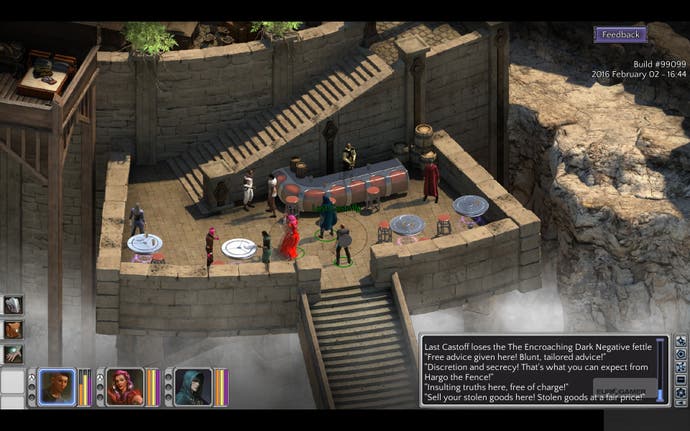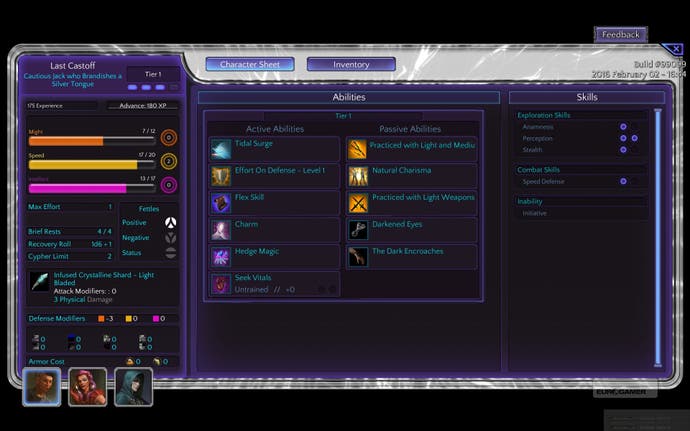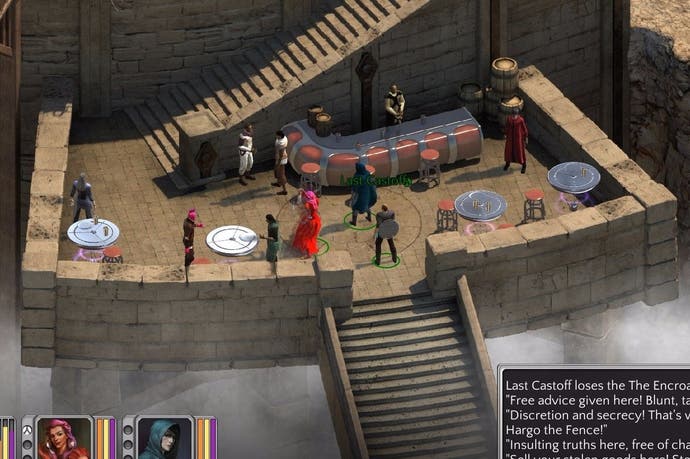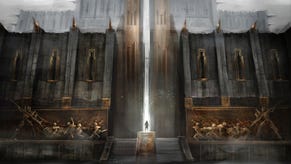Torment is unusual - and it will make unusual demands of you
Exploring inXile's old-school RPG in Early Access.
A weird scene catches my eye. There's a man standing on a rostrum with a creepy mummy-like figure behind him, and it's wrapping a rope around him - a rope coming from his mouth! Rank! I have to know more.
It's an execution and the rope-spewing man is the accused, and that thing behind him, that's his Death, a sort of living statue formed by the rope, which is actually flesh, tumbling from his mouth. Words turned to flesh, coming from a forced, hallucinatory nightmare. It gets worse, or better depending on how you look at it, because now the Death is fully formed it's using the fleshy rope to wrap around the man and squeeze him slowly to death. And when he dies, an even more ominous figure lurking behind - a hooded Devourer of Wrongs - will eat him, sucking the marrow from his bones, confirming the guilt within.
It's just a passing scene in a town, no biggie, and yet it's so typical of Torment: Tides of Numenera. This may look like something you've seen before, may even look unremarkable, but let yourself be intrigued and look again and you'll find that it it's so much more.

Having a relatively limited budget - a handful of millions - has been so liberating for this old-school role-playing game, which is now available in Early Access. Teams of people haven't spent weeks on cut-scenes that you're forced to watch otherwise the work be missed and wasted. Instead, Torment: Tides of Numenera relies on text, on imagination - and so fills its world more liberally, allowing you to miss things, which in turn makes discovery more rewarding. I can't remember the last time I explored a city so enthusiastically. I find a lady dealing in secrets, mine for hers; I find warriors fighting psychic mind wars; I learn about an odd citizenship procedure that requires instantly sacrificing a year of your life so a guard can be created to watch you. Then there are your bizarre surroundings: a world where civilisations have risen and fallen and left ancient relics far beyond comprehension and even time. Then, your bizarre predicament, as a body used by a god who has hastily just departed it.
Torment doesn't struggle for imagination but to make it really work you will need to invest yours, too, for this is a game about reading, about letting your mind wander as if you were reading a book - or as if you were playing a tabletop role-playing campaign. If you don't meet it half-way you will be left with a plain experience. Fully half of the screen can be text at times, with little going on elsewhere, although sparse but well-timed sound and visual ornaments - shouts of a crowd, flashes of light - do enough to bring to life what you read. It isn't ugly, I'm not saying that; the environments are like lovely little paintings that your rather more mundane characters trample on. But it is a game that requires your input.

It does a good job of getting you in the right frame of mind, though, pushing you down into your chair and preparing you for what comes ahead. I wrote about the the opening two minutes of the game in a separate article because they stunned me, slapped me up sharp, and this was followed by an inventive character creation sequence with not a statistic in sight. It was all story and interactive dialogue and ethical and philosophical choices about who I was. It was very effective.
But of course there are dice rolls. There are those mechanical innards - this is a role-playing game after all. It's not based on Dungeons & Dragons, that's a major differentiator from its thematic predecessor Planescape: Torment, but instead a new tabletop game called Numenera, which tends towards story rather than spreadsheets, and that's apparent here. But there are statistics, character sheets, to-hit modifiers, turns, flanking, and all that stuff. And there are new things, such as abilities connected with Tides (alignments of sorts), and ancient relics called Numenera you can use in battle. Generally, though, it's familiar and comfortable, although the implementation can be sluggish and fiddly and ultimately a bit boring, lacking the zip and zest of a turn-based game like XCOM 2. Still, it's early days, and there's usually a way out of Torment's major encounters that isn't fighting.

More broadly, the Early Access experience can be rough, and it would be unfair to scrutinise too deeply at this stage. I've had crashes, bugs preventing progress, incompatible saved games. This meant retreading sections and trying things differently, and the game is pliable in this way, but not enough to prevent my re-traipsing eventually becoming a slog. And a slog isn't how I want to remember Torment nor how I would advise you experiencing it. I hope inXile uses the months planned in Early Access - and the patient people along for the ride - to bang out the kinks and sharpen the edges.
I believe there's something special here, something unusual, something different. Not since Planescape: Torment has a role-playing game sparked my imagination in the same way. I always wondered how Torment: Tides of Numenera would - or indeed could - follow such an act, such a singular story about the very nature of human beings. Would it be possible? Well, hold your breath, because from the glimpse of Torment: Tides of Numenera I've seen, yes, I think it is.













.png?width=291&height=164&fit=crop&quality=80&format=jpg&auto=webp)



